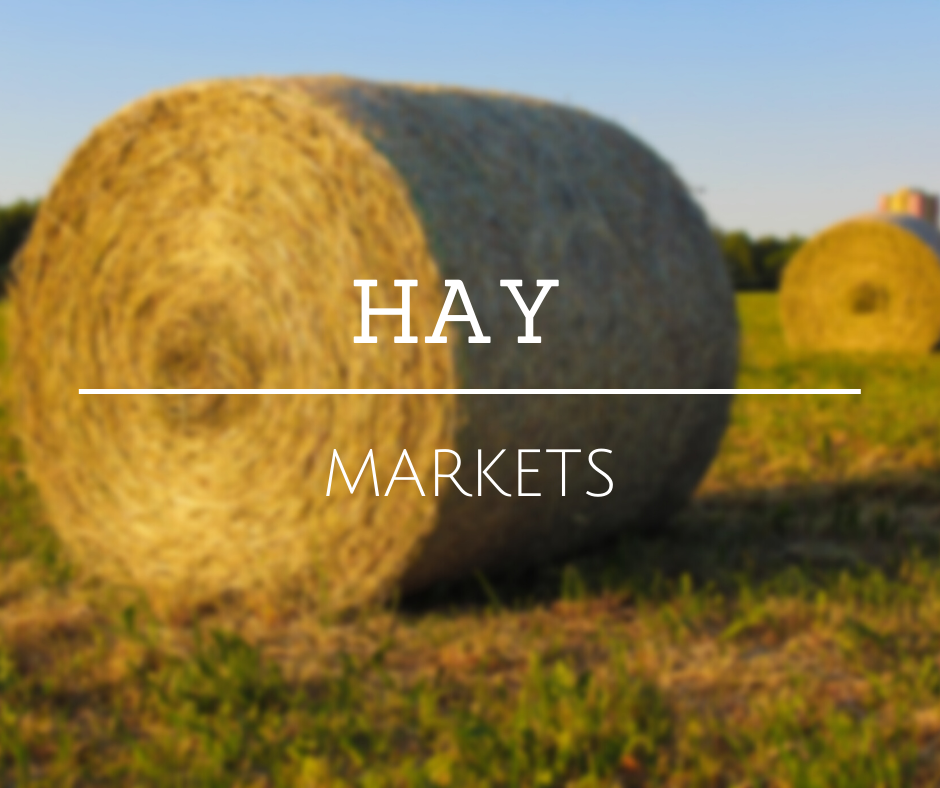Colorado—In the May 18 report, trade activity very light on good demand. All trades reported this week were on horse hay. Growers continue to put pricing available for new crop hay. No new crop trades have been reported as of yet. Offers are being thrown around for alfalfa hayleage in the $180-190 standing range, but no trades have been reported. Rain also helped to revive winter wheat and benefited emerging summer crops. Due to limited sales and price changes, this report will be released bi-weekly until more volumes of hay move.
Missouri—In the May 18 report, compared to last report, the supply of hay is light and demand is light to moderate. Even with rain in some areas hay is still looking short and that won’t change overnight but if there was ever a million dollar saving rain this might have been it. A lot of wheat, rye and the like has been wrapped and filling fence rows now. Dry hay is starting to be baled around although memorial weekend is typically when a lot of folks start hay season. Following the rains there are now reports of army worms being found in southern parts of the state.
Nebraska—In the May 18 report, compared to last report, all forages sold steady. Demand was moderate to good. The rains last week brighten the moods of most in the agricultural sector. Many cattlemen were on the fence of whether they must sell cow herds or try to find some hay to feed and wait for the rain to come. Pasture and range conditions rated 26% very poor, 31% poor, 32% fair, 11% good to excellent.
Oklahoma—In the May 12 report, compared to the last report, hay trade is slow with good demand. Drought is no help when it comes to crops in Oklahoma. Most of the wheat crop will become wheat hay this year. South of I-44 rain has helped their fields grow but has not allowed them to start cutting and bailing hay yet. Oklahoma as a whole is half a cutting behind schedule. Still, no price trends are available at this time. Next report will be released May 26.
Texas—In the May 19 report, compared to the last report, hay prices remain steady to firm in all regions. First cutting of alfalfa and grass hay has either been cut or is in the process of being laid down. Price discovery is underway however no trades have been reported as of yet. Hay demand is very good across the state. Ample amounts of moisture moved across much of the state recently and abundance of hay is expected especially in south, east, central and north Texas . Hay movement remains steady in all regions as supplemental livestock feeding continues throughout the early spring months in west and southwest part of the state. Producers continue to cull livestock due to the lack of last seasons hay even with new pasture becoming flush. Next report will be released June 2.
South Dakota—In the May 15 report, compared to last report, no reported sales of hay this week. Most hay producers have sold their hay already and are busy planting their row crops. Big rains last week came to parts of the region, delaying planting in the northern third of the state, while other parts could use another good rain. There has been substantial improvement West River as the rains finally came, but the south eastern and south central regions need more rain. Very good demand remains for hay yet, first cutting about a week away but tonnage looks to be lighter as dry, cool conditions slowed the growth of alfalfa.
New Mexico—In the May 19 report, compared to report, alfalfa hay going to dairies sold $10-$15 lower. Trade and demand moderate. The first cutting is finished in the southern part of the state. The second cutting is underway. Conditions are mostly dry, with scattered rain across the state.
Wyoming—In the May 18 report, compared to last report all reported forages sold steady. Limited supply of hay still available for sale. Most loads have been spoke for and just waiting for trucks to come and haul. Per NASS, alfalfa condition is at 61% good compared to 51% last year. Next report will be released June 1.
Montana—In the May 12 report, compared to last report, hay sold generally steady to weak. Demand for hay was mostly moderate for light offerings. Demand slipped slightly again this session as many ranchers are turning out cows and grass cattle. Some ranchers and small producers are letting small single load quantities of excess hay go at weaker prices as many fear new crop will be significantly lower than current prices. Hay continues to sell into Texas and Oklahoma, however these states started to cut new crop hay this week and many producers report that demand and calls have dropped significantly in the last few days. Winter kill is a big concern in some valleys as some producers are reporting a large number of acres needing to be replanted. Next report will be released May 26.

